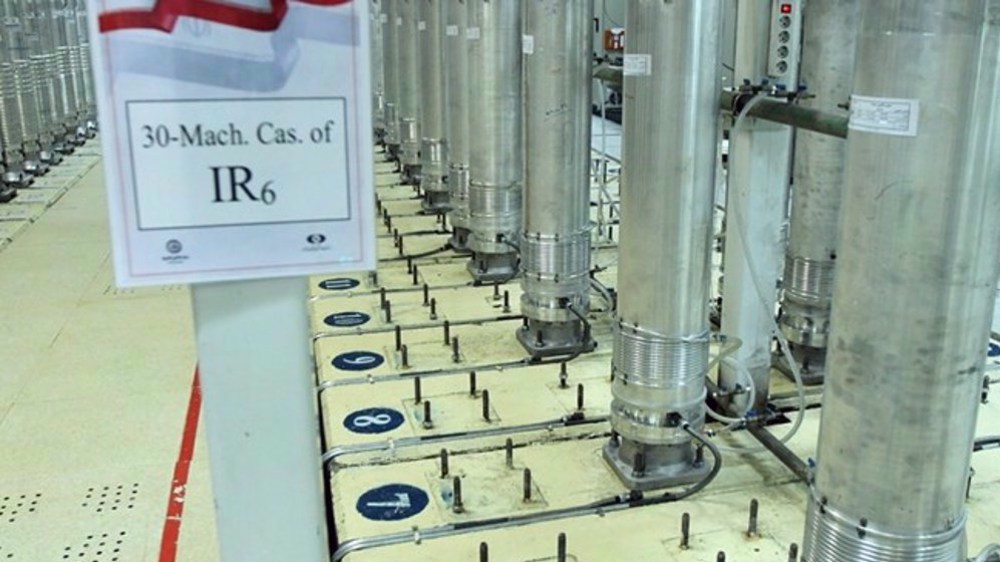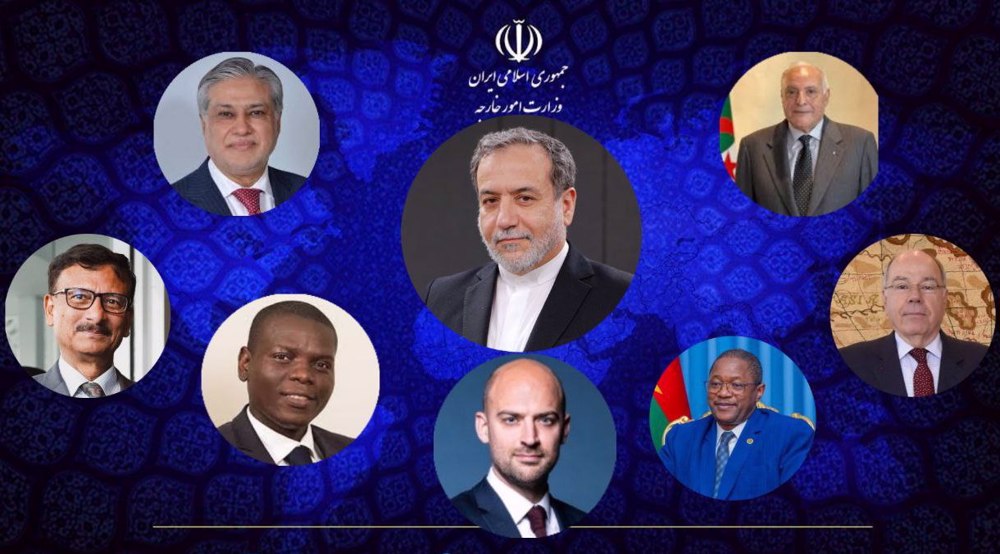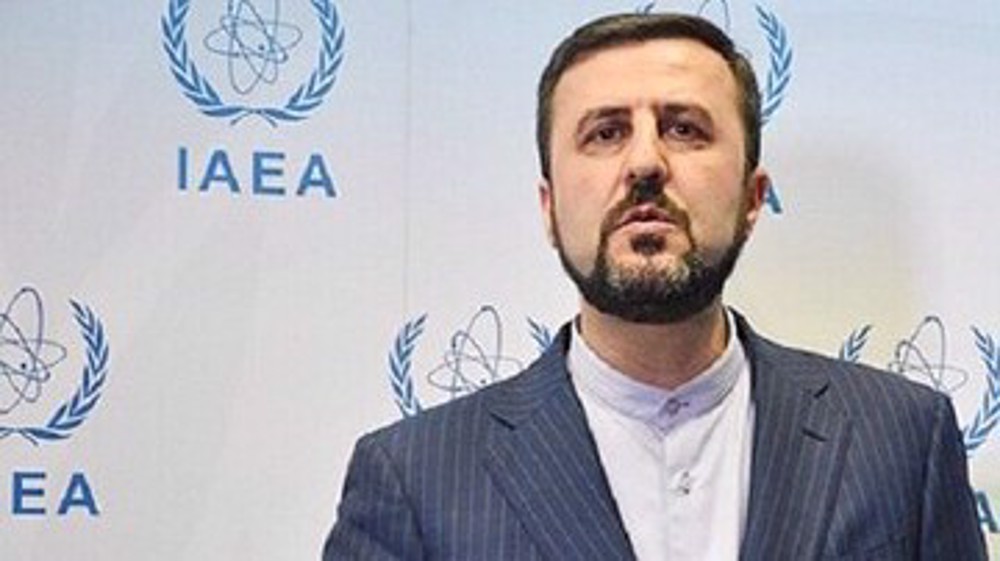IAEA inspectors in Tehran to report new activities as Iran launches advanced centrifuges
The International Atomic Energy Agency (IAEA) says it has inspectors on the ground in Iran who will be able to look into Tehran's move to turn on advanced centrifuges to increase the country's uranium stockpiles.
The United Nations nuclear agency told The Associated Press on Saturday that it was aware of the reports “related to Iran’s centrifuge research and development.”
The Vienna-based agency added that its "inspectors are on the ground in Iran and they will report any relevant activities to IAEA headquarters.”
Earlier in the day, the Atomic Energy Organization of Iran (AEOI) said that the country has started up advanced centrifuges to boost its stockpile of enriched uranium, warning signatories to a 2015 nuclear deal that the clock is ticking for them to salvage the landmark agreement in the face of pressure by the United States.
As a third step in Iran's reduction of commitments under the deal, officially known as the Joint Comprehensive Plan of Action (JCPOA), the AEOI said it has activated 20 IR-4 and 20 IR-6 centrifuges for research and development purposes.
Iranian President Hassan Rouhani said on Wednesday that the country will expand its nuclear research and development as of September 6, setting aside the restrictions imposed on the country's research and development (R&D) in the JCPOA.
"We took the first step in reducing our commitments, and gave the P4+1 a two-month deadline. Then we went ahead with the second phase, giving them another two-month deadline. In the four-month period, we held negotiations with the P4+1, including the European Union and the three European countries in particular," Rouhani said.
The third step comes after the Europeans failed to meet a 60-day deadline to meet Iran’s demands and fulfill their commitments under the multilateral deal.
Iran says its retaliatory measures will be reversible as soon as Europe finds practical ways to shield the mutual trade from the US sanctions, which were re-imposed last year when President Donald Trump withdrew from the JCPOA.
An IAEA spokesman said on Friday that the acting chief of the agency, Cornel Feruta, plans to visit Iran to hold talks with high-level Iranian officials in Tehran on Sunday.
"The visit is part of ongoing interactions between the IAEA and Iran," the agency's spokesman said.
Feruta's visit to Tehran comes before a quarterly meeting of the IAEA's 35-country Board of Governors in Vienna on Monday.
Read more:
- EU spokeswoman says Europe's trade mechanism with Iran going on
- EU welcomes any progress beyond maintaining Iran nuclear deal: Mogherini
Iran’s use of advanced centrifuges should not be over-dramatized: Russia
Meanwhile, Russia's Permanent Representative to the IAEA Mikhail Ulyanov said that Iran’s latest decision to activate its advanced centrifuges “should not be over-dramatized,” emphasizing that balance within the Iran nuclear deal must be restored.
"Decision of #Iran to use more advanced centrifuges shouldn’t be over-dramatized. Yes, it’s another deviation from #JCPOA, but new activities will remain verifiable by #IAEA and reversible," Ulyanov said in his Twitter account on Saturday.
Decision of #Iran to use more advanced centrifuges shouldn’t be over-dramatized. Yes,it’sanother deviation from #JCPOA, but new activities will remain verifiable by #IAEA and reversible. No proliferation threat. Just a strong signal that balance within the JCPOA must be restored.
— Mikhail Ulyanov (@Amb_Ulyanov) September 7, 2019
He added that the move is "no proliferation threat" but "just a strong signal that balance within the JCPOA must be restored."
Britain: Iran's latest nuclear move 'particularly disappointing'
Britain also on Saturday said that Iran's announcement that it had activated advanced centrifuges was "particularly disappointing."
"This third step away from its commitments under the nuclear deal is particularly disappointing at a time when we and our European and international partners are working hard to de-escalate tensions with Iran," the Foreign Office said in a statement.
France vows to pursue efforts to bring Iran to comply with JCPOA
In reaction to Iran’s third step in scaling back its commitments, French Defense Minister Florence Parly said on Saturday that Paris will continue efforts to bring Iran into full compliance with the nuclear deal.
"We can only confirm our goal, which is to bring Iran to fully respect the Vienna deal. And we will continue to push towards this; all diplomatic efforts are oriented towards this. The [French] president is personally involved in it, so it must be pursued," Parly said at a joint news conference with US Defense Secretary Mark Esper in Paris.
In a phone conversation with President Rouhani late last month, French President Emmanuel Macron praised Iran’s commitment to talks on ways to resolve a standoff over its nuclear program.
Macron added that an earlier trip by Iranian Foreign Minister Mohammad Javad Zarif to France, which coincided with a summit of G7 group of industrial nations in the country, showed that Iran was still committed to the principle of diplomacy on its nuclear dossier despite sanctions imposed by the US.
Read more:
- Iran, France hold intensive expert-level talks on ways to save nuclear deal
- Iran may not take third step to reduce nuclear commitments if Europe acts: Zarif
- Talks with French president on nuclear deal constructive: Iran FM
- US appetite for breaking intl. law won’t stop at JCPOA: Iran FM
- Lavrov: Putin backs Macron's initiative to save Iran nuclear deal

The US defense secretary also said that he was "not surprised" by Iran's announcement that it lifted limitations to developing advanced centrifuges, claiming that Tehran has been violating the JCPOA and the nuclear Non-Proliferation Treaty (NPT) despite various IAEA reports verifying the Islamic Republic's full compliance with the nuclear accord.
"I'm not surprised that Iran has announced that it is going to violate the JCPOA. They have been violating it. They had violated the nuclear non-proliferation treaty for many years," Esper said.
"Iranians are going to pursue what the Iranians have always intended to pursue," he added.
Read more:
- IAEA verifies Iran's compliance with JCPOA on heavy water stockpile limitation
- Iran vigorously moving towards fulfilling its nuclear objectives: AEOI chief
- Foreign Minister Zarif warns US to 'not play with Iran'
Elsewhere in the Saturday presser, the French defense minister also said that the US and European claims about moves to strengthen security in the Persian Gulf must be "complementary and well coordinated."
"We must do everything we can to contribute to ease tensions with Iran and to ensure navigation safety - it is important, it is a right, it is a freedom recognized by international treaties, and must do everything so that it is respected," Parly said.
The US has announced plans to form a coalition force to protect shipping in the Strait of Hormuz from what it calls an Iranian threat, asking allies to join the force.
The move comes amid Washington's attempts to trouble Iran’s oil sales as part of its sanctions campaign targeting the Islamic Republic's economy.
Iran has strictly blasted the US plan and the idea of foreign military presence in the Persian Gulf, stressing the security of the strategic region can be guaranteed only by regional countries.
VIDEO | Former FBI agent criticizes US Congress for 'outright corruption'
IRGC chief urges Muslim countries to cut aid routes to Israel
'New chapter in cooperation': Iran, Venezuela sign new MoUs
Jordan sentences former lawmaker for supporting Palestinian resistance
Basij volunteer forces hold massive drills in southwestern Iran
Israeli war criminals 'not welcome', US city says after ICC ruling
US vetoing of Gaza ceasefire resolution ‘disgraceful’: Iran’s UN envoy
VIDEO | IAEA adopts anti-Iran resolution tabled by E3













 This makes it easy to access the Press TV website
This makes it easy to access the Press TV website